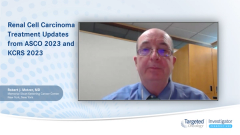
Updates from ASCO 2023 for Non–Clear Cell RCC
A medical oncologist reviews recent data updates from the 2023 ASCO Annual Meeting for non–clear cell renal cell carcinoma.
Episodes in this series

Transcript:
Robert J. Motzer, MD: There were some recent updates and abstracts at the ASCO [American Society of Clinical Oncology] meeting that addressed non–clear cell RCC [renal cell carcinoma]. And for the most part, they were updates. There was a presentation on cabozantinib plus nivolumab in non–clear cell RCC that showed a longer follow-up to an original presentation and publication that showed activity for cabozantinib plus nivolumab in patients with papillary RCC or those with unclassified, with papillary features, or even rarely in translocation-associated RCC. The trial was not new. The data were very similar, but it was an update, and it was reassuring in terms of some of the durability.
In that particular trial, there were really 2 parts, and the other part was in chromophobe tumors. And the chromophobe arm for patients treated with cabozantinib plus nivolumab closed early based on a lack of response. Lenvatinib plus pembrolizumab has also been studied in a large phase 2 single-arm study that was global, and a part of those data were originally presented at the ESMO [European Society for Medical Oncology] meeting in October. But the larger complete series was published at ASCO, and that showed a reasonable response rate and progression-free survival for lenvatinib plus pembrolizumab. One of the differences in that trial was that there did appear to be activity in chromophobe tumor. And this was an area previously [where] this particular tumor has been one that has been really quite resistant to immunotherapy. There was excitement with regard to that particular program. And it may be in certain ways the lenvatinib is very important with the pembrolizumab for the chromophobe tumors.
There was a third study that was reported to ASCO, and that was a triplet, ipilimumab, nivolumab, plus cabozantinib in non–clear cell RCC, and that was reported by Bradley McGregor, MD, et al, from the Dana-Farber Cancer Institute. That study took off from the COSMIC-313 trial [NCT03937219], which was that same triplet compared with ipilimumab-nivolumab in first-line therapy for RCC. That was an extension of that triplet to the non–clear cell RCC. The outcome of that trial, however, was disappointing. The response rate was low, and the adverse events related to that program were quite substantial, particularly liver toxicity and diarrhea. From my view, that triplet—cabozantinib, nivolumab, ipilimumab—from the data that were presented, does not have a role in standard of care for non–clear cell RCC. In contrast, I do think that cabozantinib plus nivolumab and perhaps lenvatinib plus pembrolizumab are suitable treatments outside a protocol for the non–clear cell histologies.
One other point to emphasize is that we need more information in terms of these particular diseases, and we need better therapy. Non–clear cell RCC is also an area where we really need to emphasize clinical trials and develop novel treatment strategies for that wide spectrum of very heterogeneous disorders.
Transcript is AI-generated and edited for clarity and readability.









































